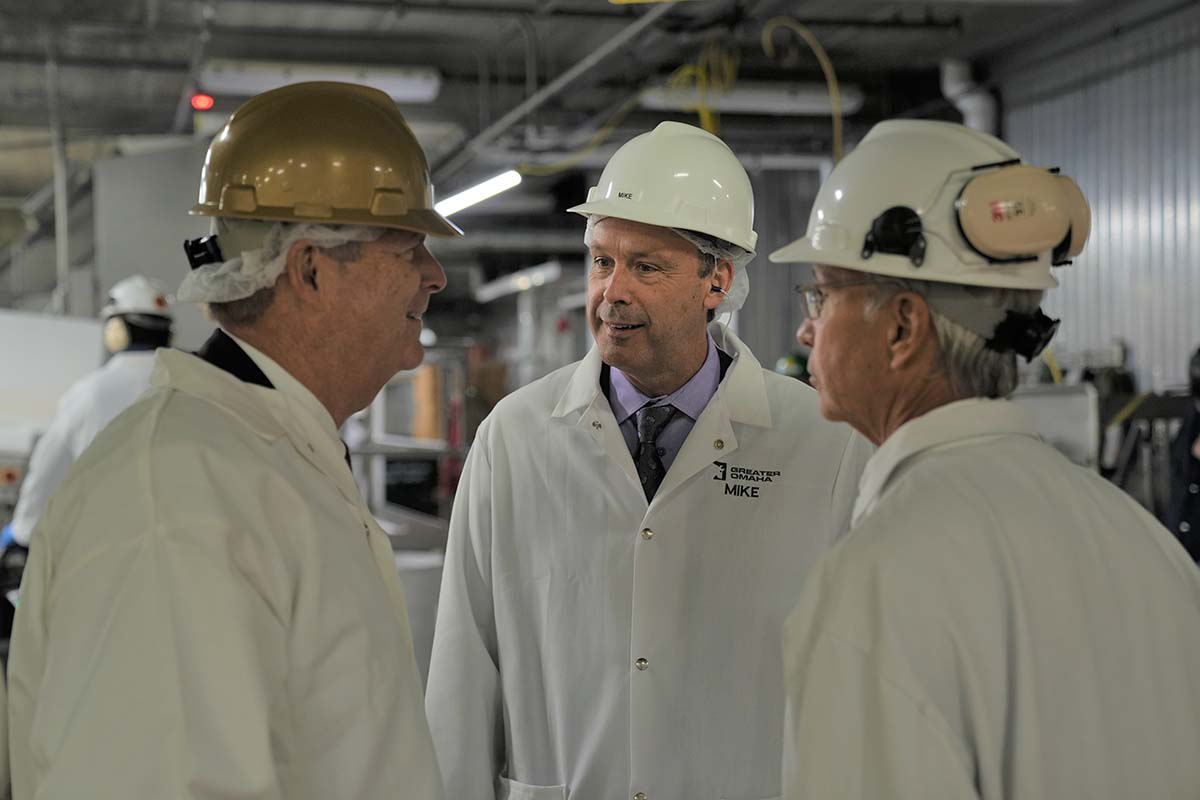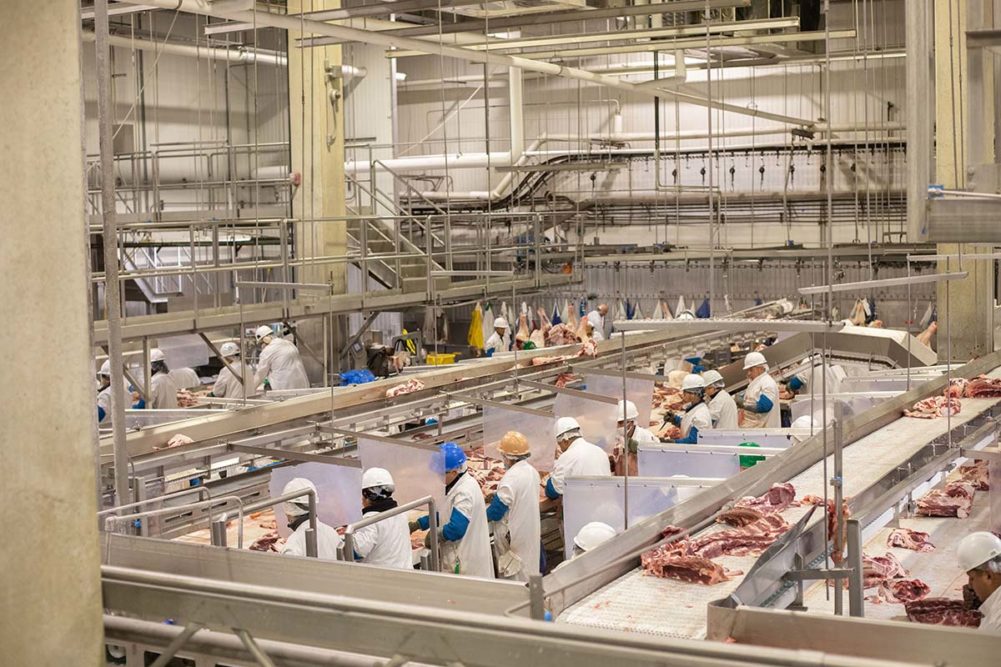Mike Drury remains focused and prepared to lead Greater Omaha Packing Co. into its upcoming chapters of meat processing.
The president of Greater Omaha recently discussed how the company plans to use a $20 million USDA grant through the Meat and Poultry Processing Expansion Program (MPPEP). The company will use the funding for its $100 million investment to upgrade its existing processing facility.
After the project is completed, the company estimates it will have the capacity to process an additional 700 head of cattle each day.
“We had already been putting together a road map of investments and future capabilities that we felt were important to remain relevant and competitive in our industry,” Drury said about the plant investment. “This list was long, so we had prioritizations to make, and at the same time, the opportunity came along for Greater Omaha to apply for the grant.”
Greater Omaha’s centralized location in Omaha, Neb., benefits the meat company, which currently processes about 2,400 cattle per day and fulfills orders for customers in the United States and worldwide.
Drury explained how Greater Omaha adapts to its clients in any meat marketplace situation. Another emphasis for Drury remains the ongoing dialogue with cattle suppliers and ensuring transparency and communication are top priorities. Drury also emphasized maintaining the strong, diverse workforce built up over many years.
“Our facility serves over 35 countries, which can create some complexity,” he said. “Still, I’m proud of how we’ve embraced our different backgrounds and perspectives and leveraging that diversity to make us better.”
MEAT+POULTRY: In November 2022, it was announced that Greater Omaha was awarded $20 million through the Meat and Poultry Processing Expansion Program (MPPEP). What will be the priorities for the plant with the USDA grant money?
Mike Drury: There are three to four capabilities we need to address and respond to in our facility to continue being prepared to meet our customers’ needs and changes in the marketplace. One of the first things we’re embarking on is the further automation of our product handling of our frozen items. We went through a large project in 2018 where we significantly upgraded our box automation for our fresh beef. We’re going to be making the same improvements on our frozen side. It will substantially improve our product handling and shipping of products that travel halfway around the world to the many international markets.
M+P: Talk more about the other projects Greater Omaha will work on in the next few years.
Mike Drury: As we complete the frozen product handling system, we will free up valuable internal space to dedicate more effort to the areas our customers ask us about. This extra space will enable us to enhance product fabrication by achieving a more refined, retail and foodservice-ready state through further trimming. It’s efficient and safer from a product standpoint if we can do this extra work right in line.
In addition, we have some needed infrastructure work, and the grant will help assist in making enhancements to increase our capacity for wastewater management using new technology. We want to ensure we’re good stewards in town as we manage our water needs today and in the future. We must increase those capabilities before we can expand any additional beef processing capacity.
M+P: How crucial is it to Greater Omaha to have cattle inventory within 200 miles of your facility?
Mike Drury: We are blessed in our geographic location. We have land, we have water, we have corn, and we have the right kind of weather to produce great high-quality cattle. We have learned over the past several years with the turmoil in the marketplace that producers are counting on us daily to be ready and flexible. We feel we have responded well to their needs for processing and our relationship has grown more dependent on each other. We enjoy that position with these producers and continue to want to support them. They are providing the high-quality cattle that we really like and that our customers expect from Greater Omaha.
 Mike Drury (center) took over the role of president of Greater Omaha in January 2021. (Source: Greater Omaha Packing Co.)
Mike Drury (center) took over the role of president of Greater Omaha in January 2021. (Source: Greater Omaha Packing Co.)M+P: Implementing automation is crucial to business growth, but so is maintaining the labor force and recruitment. Can you discuss how you combine those two initiatives going into the company’s future?
Mike Drury: When we evaluate new technologies, we are very mindful of the potential impact on our workforce. Some of these projects can drastically change or even eliminate work that was being done manually. In such instances, we are transparent about the impending changes, the nature of the evolving work, and our commitment to retaining skilled labor at Greater Omaha on a daily basis. We provide a wide range of retraining opportunities and our ongoing expansion creates chances for both current and potential employees to acquire new skills.
M+P: How do you build and maintain those relationships with cattle ranchers/producers throughout this process?
Mike Drury: We buy from over 1,000 different producers yearly, so that one-on-one relationship with the farmer feeder that provides one to two loads of cattle is absolutely critical. We can be more accommodating to those operators because of our size and flexibility, whether a small feedlot of under 1,000 or a cow-calf operator with 50 mother cows and one load of calves to sell in the fall. We want to be there for that individual.
M+P: Since you work with so many different customers, does that make you a wanted partner for beef processing?
Mike Drury: It does, and that piece has been exciting. In fact, we’ve added a new role in our organization, someone that’s managing our supplier development and we’re having more dialogue with those ranchers and producers as a result. This role and this individual support the great work our cattle buyers are already doing with our producers but as we talk further, there’s still a need or a desire for more communication.
M+P: In the last year or so you’ve made it a point to host cattle suppliers on visits to your headquarters. How has that helped everyone in the supply chain understand what you are doing at the Omaha plant?
Mike Drury: The timing of these events over this last year and a half has been fortunate.
We’re sharing with them what’s on our minds and what our customers are telling us. We will continue to do the daily and weekly transactions of buying and selling cattle, but in these discussions, we can put that aside for a minute and talk a little bit farther down the road.
Initiating this dialogue enables us to openly discuss our concerns, opportunities, and listen to their challenges and expectations. It fosters a valuable and constructive exchange of ideas.



